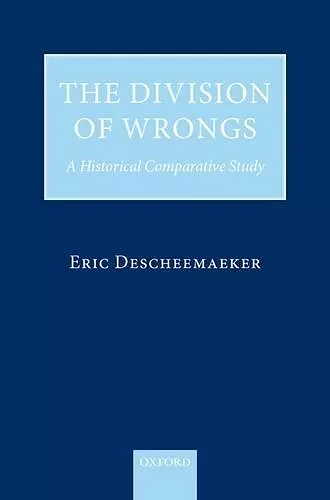The Division of Wrongs
A Historical Comparative Study
Format:Hardback
Publisher:Oxford University Press
Published:18th Jun '09
Currently unavailable, and unfortunately no date known when it will be back

The common law, despite procedural divisions, has only ever had one class of civil wrongs. The civilians, by contrast, have typically split their law of wrongs in two, one group being called delicts and the other quasi-delicts. Yet this division, which originated in Roman law, remains mysterious: it is clear neither where the line was drawn nor why a separation was made along this line. This book does two things. In the first two parts, it investigates the origins of the division and its development in a modern civilian jurisdiction, France. What is argued for is that the Roman dichotomy was originally one between fault (culpa)-based and situational liability, which was prompted by a historical contraction of the Roman concept of a wrong (delictum). French law, building on medieval interpretations of the division, redrew the line one level higher, between deliberate and negligent wrongdoing. By doing so, it involved itself in severe taxonomical difficulties, which the book explores. The third part of the work concerns itself with the significance of the civilian division of wrongs according to degrees of blameworthiness (dolus, culpa, casus) for the common law. A provocative thesis is developed, in effect, that there is a strong case for the adoption of a similar trichotomy as the first-level division of the English law of civil wrongs. From its formulary age, English law has inherited an unstable taxonomy where wrongs intersect. The existence of these mismatched categories continues to cause significant difficulties, which a realignment of causes of action along the above lines could rectify.
Dr Descheemaeker's book is genuinely to be welcomed as a fine piece of historical research and analysis on the doctrine devoted to legal classification. * Geoffrey Samuel, Cambridge Law Journal *
...this book is to be recommended...After two introductory chapters, the work is in three parts...in addition to advancing the overall thesis, each part contains valuable arguments with respect to the specific area considered. For a book which is both intricate and Polyglot, it is written in an accessible style * James Lee, University of Birmingham, Legal Studies, Vol 30.2 *
The current focus of tort scholarship - contemporary comparative analysis - cannot be undertaken properly without an idea of why legal systems structure their tort laws in the way they do. Descheemaeker's book is an invaluable contribution in that respect...The Division of Wrongs is a most impressive contribution to the field of delict. It displays a maturity of analysis and degree of comfort with seminal source material normally found in the work of n established author, and thus all the more remarkable in the first monograph of an academic at the start of his career. This book should certainly find a place in the library of anyone with a serious historical interest in the European law of wrongs. * Martin Hogg, Edinburgh Law Review Vol 14, 2010 *
The Division of Wrongs is an inventive and serious addition to the literature...Dr Descheemaeker...demonstrates the value of comparative and historical scholarship for private law jurisprudence. * James Lee, Legal Studies Vol. 30 N0.2, 2010 *
ISBN: 9780199562794
Dimensions: 241mm x 162mm x 25mm
Weight: 664g
328 pages